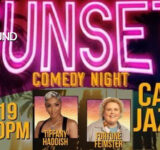By Sheryl Aronson
Los Angeles, CA –When guest musician Bird York (Academy Award Nominee for her song “In The Deep,” from the Oscar-winning film, Crash) told the audience at Vicki Abelson’s Women Who Write Literary Salon on Tuesday, January 27th, that she didn’t want to play sad songs she had written after the recent breakup of her long-term relationship, Norman Lear piped in and requested that she sing her compositions which reflected her pain. “Those are the ones I want to hear,” he said. This funny yet serious appeal opens the door into Norman Lear’s character and exemplifies one of the reasons he’s been so successful.
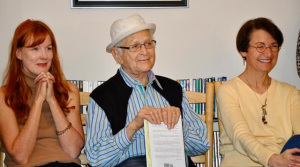
Mr. Lear doesn’t run away from the harsh realities of life and knows how to bring humor into the most painful of situations. Keenan Wayans, a successful black comic once told Oprah Winfrey, “Comedy is a mask for pain. Those who are innately funny are the most innately disturbed.”
A unique forum for artists, at VA’s Women Who Write even icons read from their work. While hearing opening pages from Mr. Lear’s recently published memoir, we learned of some of his disturbing childhood experiences, such as his mother’s abandoning him to relatives from the age of nine to twelve while his father was in jail. It’s no wonder that he became the “King of Television Comedy Sitcoms.“ His outer and inner existence was full of pain as a child. Mr. Lear recalled a time when he was in dire straits, just about to lose his house, and instead of feeling discombobulated about the loss, he accepted his plight and reframed the negative occurrence, “Even this, I get to experience,” which led to new thinking and the title of his book.
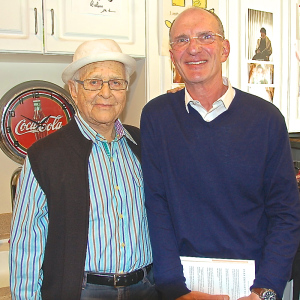
Everyone who attended the event that Tuesday afternoon, including, Phil Doran, an ex-writer/producer for All In The Family, and Norman’s eldest daughter, psychologist, Ellen Lear, exuded enthusiasm as they sat in their chairs waiting for the iconic man to enlighten us with his genius. This was Norman Lear standing behind the podium, a nonagenarian, the emblematic white hat sitting on top of his head, full of stories about some of the most popular television sitcoms ever produced in the history of America’s small screen media.
“Norman made me write characters that were honest,” Phil Doran said when recalling his days as an upstart writer. “He wouldn’t let a joke of mine through and I didn’t understand why. Norman said, ‘Your joke was what a writer would say.’
“He always encouraged us to be honest with writing out characters. Hearing him talk today is revitalizing… calming… reassuring… soothing.”
Ellen Lear said, “I’m so proud of my father. Even though I’ve seen him speak numerous times, I still get tears in my eyes when he’s talking.” She revealed an attention-grabbing story of her own about Sally Struthers, the actress who played Gloria in All In The Family. “I had just moved to The Hollywood Studio Club starting out in my career as a graphic designer. I saw Sally in a play called You’re a Good Man Charlie Brown. When my father began casting All In the Family, I remembered thinking Sally would make a good Gloria. Time went by and one day I asked my father who he had cast in the role of Gloria. He replied, “Some actress you have never heard of, Sally Struthers.” I laughed to myself that I had had that insight back then.”
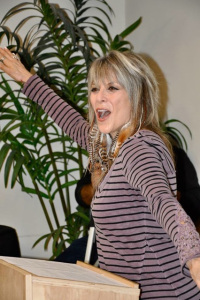
Vicki Abelson kvelling (Yiddish word meaning to beam with pride and pleasure) over Norman’s too many to count accomplishments, spoke effusively about her hero. A comedic actress herself, Vicki chose the eccentric Mary Hartman, played by Louise Lasser as her favorite of Lear’s characters. “Mary Hartman, Mary Hartman changed my life.” She talked about watching the show on a tiny television backstage when she was doing theater in her college days in Tucson. “There was no way any of us were going to miss that show.” She had the rare experience of meeting Louise Lasser at a doctor’s office in recent years and was mortified that no one recognized the actress. “I talked with her for an hour while we were waiting to get our tits smashed. It was thrilling.”
Vicki, after apologizing for taking up “room” in her home as we readied for Mr. Lear, read us her then about to publish, irreverent, relatable to many in the crowd, Huffington Post piece about online dating. As she began introducing Mr. Lear she recounted him illuminating in his memoir that Archie Bunker was based on his father and asked who inspired Edith—noting his difficult mother did not seem the source. “But you’ll tell us about that…” The funny man yelled, “If I get there.” As Vicki started listing the long citation of Norman’s credits, he sprang from his seat and took to the podium, receiving a standing ovation. “It’s the first time I’ve ever been introduced by a true hysteric. But, she also has all the heart in the world, enough to get me here. A lot of genuine heart there… and hysteria.”
Mr. Lear entertained us with tales of his background, his start in show biz, his philosophy of creating television shows and characters, and what it means to be funny. The adoring crowd couldn’t get enough.
As the Q & A began, Vicki asked her question again, “Who inspired Edith?” For perhaps the first time publicly, Mr. Lear shared that whenever they wrote for her they would ask themselves, “How would Jesus react?” The crowd exuded a collective “Ah!” Norman shared that at one point he wondered what would happen if Edith lost her faith. His two favorite episodes of All in The Family were sparked by that curiosity. Archie unknowingly gave CPR to a transsexual. Edith responded to that person with love, as Jesus would. The transsexual was then murdered. “If that human being was killed simply for being who he/she was then Edith could lose her faith. It took weeks to figure out how she would regain it. One day someone naively asked, ‘When Edith lost her faith, what happened to Archie?’ And then we had the answer. If Edith loses her faith, she loses her strength and courage. Archie depends on that. He can’t be who he thinks he was without a strong Edith.”
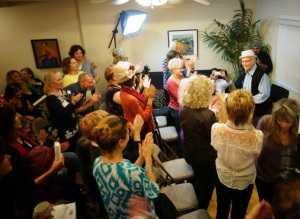
For a better part of an hour Norman Lear encouraged and graciously responded to a barrage of thoughtful questions from the jammed roomful of writers – all ardent fans. He stayed for another hour, posing for photos, sharing laughs, moments, and some food. These intimate monthly gatherings have come to be known for this. It’s a sacred part of the day.
If you want to stand next to this amazing artist as well, pick up his memoir, Even This I Get To Experience. The book is long, but so are his credits as a human being and an artist.
And, join us on February 24th, when Anson Williams will share how he’s so much more than just our beloved Potsie. It’ll be a Happy Day, indeed.





